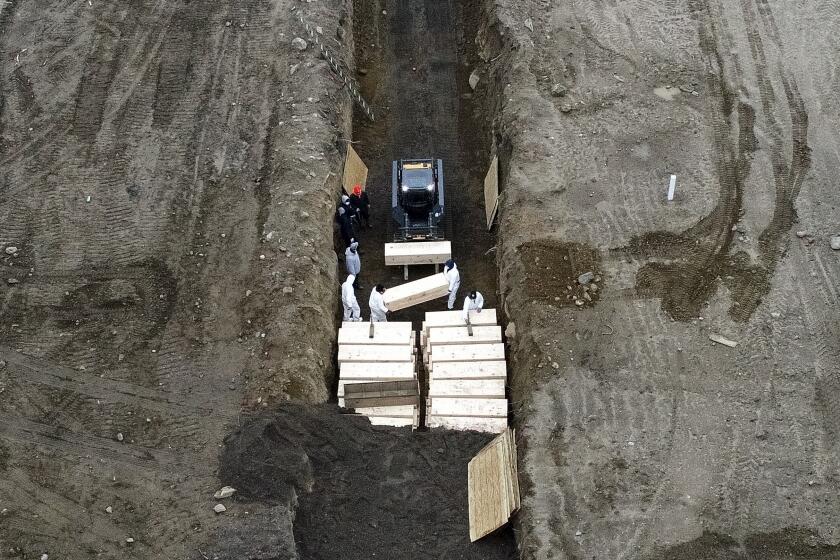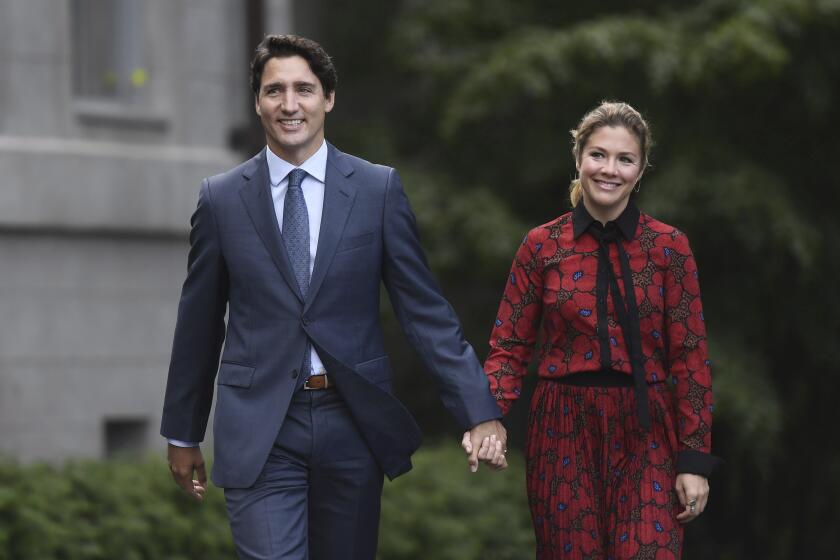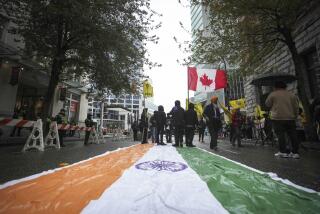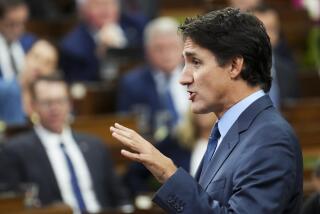The coronavirus scare brings fresh tension between Canada and the U.S.
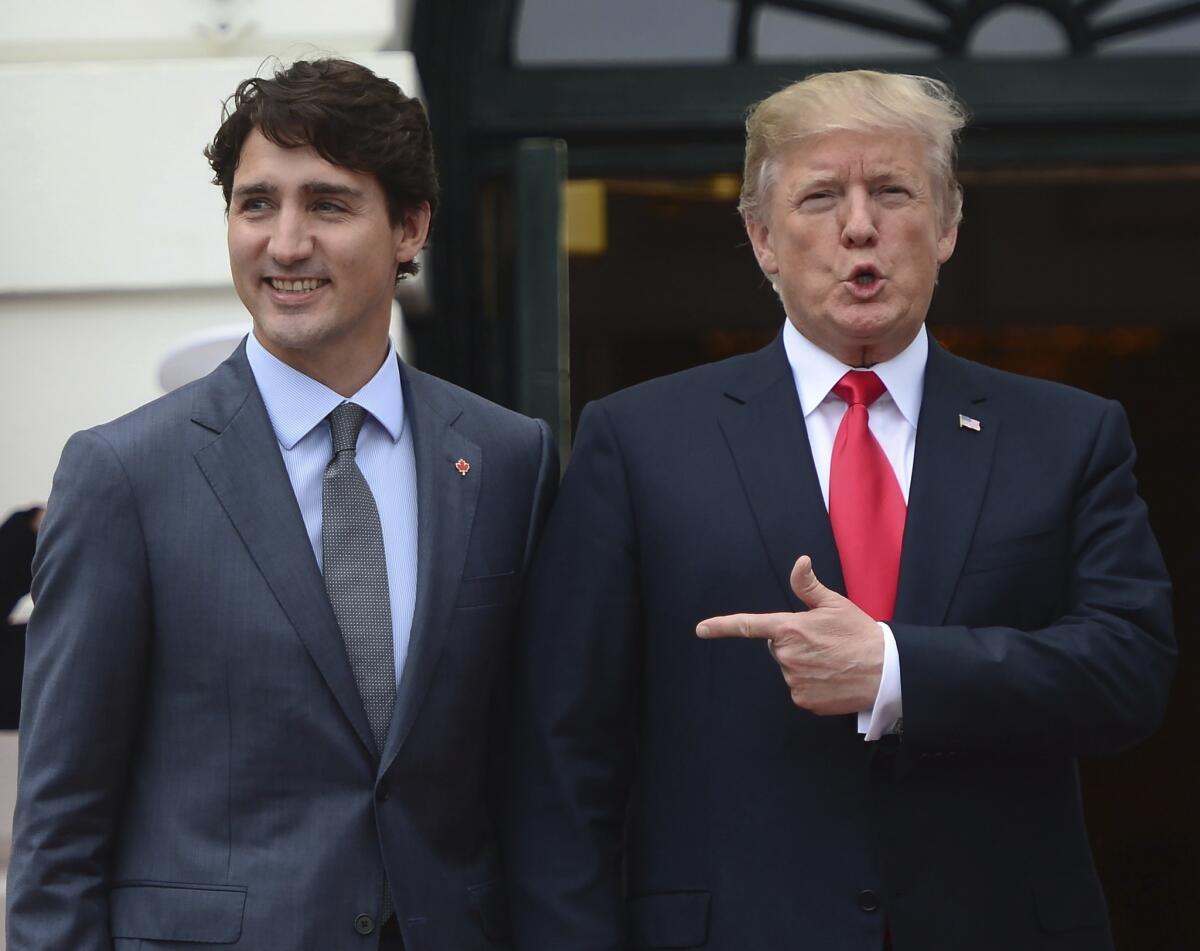
The coronavirus crisis has increased tension between Canada and the United States, bringing a new challenge to the longtime amity that has existed between the neighboring nations.
For the record:
3:19 p.m. April 17, 2020A previous version of this article mistakenly referred to Stéphane Paquin of the Ecole nationale d’administration publique as Stéphane Roussel.
The friction has been felt intimately amid COVID-19 fears, which has resulted in U.S. citizens being unwelcome in Montreal, Toronto and Vancouver and in multiple cities and rural crossroads across the country because of health concerns tied to the possible spread of the virus.
Much of Canada shuddered when President Trump floated the idea last month of battling the virus by deploying troops at the world’s longest land boundary to protect against anyone infected with the virus entering the U.S.
This contretemps followed a series of episodes that shook Canadian confidence in its southern neighbor and longtime ally. Canadian diplomats were troubled by Trump’s public doubts about the value of the North Atlantic Treaty Organization and his insistence on the renegotiation of the North American Free Trade Agreement by the United States, Canada and Mexico.
In addition, Trump and Prime Minister Justin Trudeau repeatedly have jousted, with the president once describing Trudeau in a tweet as “Very dishonest & weak” after he left a 2018 G-7 summit in Quebec.
As the worldwide COVID-19 death toll topped 100,000, the U.S. was on the brink of surpassing Italy as the nation with the most fatalities.
To many, the relationship has felt unusually uncomfortable considering the many historical ties that bind the countries, beginning even before they became nations.
For centuries, people have traveled north for any number of reasons including Loyalists fleeing Revolutionary passions in the 18th century or runaway slaves traveling the Underground Railroad to Canadian safety in the 19th century or Vietnam-era war resisters fleeing the draft in the 20th century. Many of them found safety and serenity in a land that, in the words of the British North America Act of 1867, considered the country’s founding constitution, is grounded in “peace, order and good government.”
“The Canada-U.S. relationship no longer feels special and that’s in large part Trump’s doing,” said Stéfanie von Hlatky, a political scientist at Queens University in Kingston, Ontario.
“From his erratic behavior in the NATO context to the renegotiation of NAFTA, the latest coronavirus-related jabs are keeping up with the trend of carelessness when it comes to how the U.S. is dealing with its close allies,” she said. “Canada will probably have to deal with other issues as a direct result of how Trump is mishandling the pandemic crisis.”
Deputy Prime Minister Chrystia Freeland said at a news conference last week that Canada had made clear its opposition to the Trump administration’s idea for border troops.
“This is an entirely unnecessary step which we would view as damaging to our relationship,” she said.
The Trump administration subsequently backed away from the proposal. Officials also have said that leaders from the two countries have discussed the pandemic and their close cooperation in fighting the coronavirus.
It took her illness to jolt Canada into action. Schools closed. Gyms emptied out. Antibacterial wipes were hard to find. Grocery stores were mobbed.
In recent days, Canadians have expressed worry that people traveling north into the country may spread the the coronavirus. They are especially concerned that truck drivers permitted to cross the 5,525-mile border between the two countries may bring COVID-19 along with commercial goods.
Many in Canada have said they worry that the 1,600 nurses who live in Windsor, Ontario, and commute daily to hospitals in Detroit may bring the virus home with them, and that they were upset by Trump’s demand that the 3M Corp. cease sending N95 medical-grade face masks to Canada because he wanted them for domestic use.
“There are concerns especially about people from New York,” said Stéphane Paquin, a specialist in Canadian international relations at the Montreal campus of the Ecole nationale d’administration publique. “There are lots of links between Montreal and New York, and there have been cases of contamination in Quebec from people who traveled to New York City for a couple of days. It’s become a matter of concern.”
There have been squalls in the two countries’ relationship before. Canada, which had participated in the Korean War and the 1991 Gulf War, refused to join George W. Bush’s “coalition of the willing” in the Iraq war that began a dozen years later. The country was deeply offended when Trump cited “national security” concerns in imposing steel and aluminum tariffs on imports from Canada in 2018.
But many in Canada wonder why the United States, which pressed so hard to renegotiate NAFTA, has delayed approving the successor, the USMCA trade pact, which now is not expected to enter into force until summer. The new pact includes intellectual property protections, strong provisions for the protection of trade secrets, safeguards to protect U.S. financial-services companies and environmental protections.
Ontario Premier Doug Ford, a populist sometimes compared to Trump, said the president’s effort to halt exports of medical supplies was unacceptable.
Saskatchewan Premier Scott Moe called the medical supplies issue “nothing short of a betrayal,” and Dwight Ball, premier of Newfoundland and Labrador, said he was infuriated with the president, adding that residents of his province “acted fast and did what was necessary” by welcoming U.S. jet travelers after the Sept. 11, 2001, attacks.
An agreement Monday between the two countries and a manufacturing company cleared the way for 500,000 masks to be sent to Canada’s largest province, where the protective devices were in dangerously short supply. U.S. officials had intercepted nearly 3 million masks at a South Dakota factory that were intended for export to Ontario in hopes of keeping the masks for use at healthcare facilities in the states.
Trudeau has said Canada would not seek to retaliate against the United States or take unspecified “measures that are punitive.”
“We know it is in both of our interests to work collaboratively and cooperatively to keep our citizens safe,” he said in Ottawa last week.
Meanwhile, fears of the import of coronavirus remain strong.
“We can’t help but wonder if the mayhem that is being experienced by hospitals in New York State and nursing houses in Washington state — both of which are snuggled up against the Canadian border — will soon spill over,” Andre Picard wrote late last month in the Globe and Mail newspaper.
Shribman is a special correspondent.
More to Read
Sign up for Essential California
The most important California stories and recommendations in your inbox every morning.
You may occasionally receive promotional content from the Los Angeles Times.
